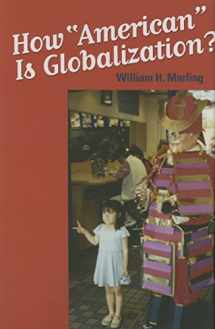
How "American" Is Globalization?
Book details
Summary
Description
William Marling's provocative work analyzes―in specific terms―the impacts of American technology and culture on foreign societies. Marling answers his own question―how "American" is globalization?―with two seemingly contradictory answers: "less than you think" and "more than you know." Deconstructing the myth of global Americanization, he argues that despite the typically American belief that the United States dominates foreign countries, the practical effects of "Americanization" amount to less than one might suppose.
Critics point to the uneven popularity of McDonalds as a prime example of globalization and supposed American hegemony in the world. But Marling shows, in a series of case studies, that local cultures are intrinsically resilient and that local languages, eating habits, land use, education systems, and other social patterns determine the extent to which American culture is imported and adapted to native needs. He argues that globalization can actually accentuate local cultures, which often put their own imprint on what they import―from translating films and television into hundreds of languages to changing the menu at a McDonalds to include the Japanese favorite Chicken Tastuta.
Marling also examines the unexpected ways in which American technology travels abroad: the technological transferability of the ATM, the practice of franchising, and "shop-floor" American innovations like shipping containers, bar codes, and computers. These technologies convey American attitudes about work, leisure, convenience, credit, and travel, but as Marling shows, they take root overseas in ways that are anything but "American."


We would LOVE it if you could help us and other readers by reviewing the book
Book review



